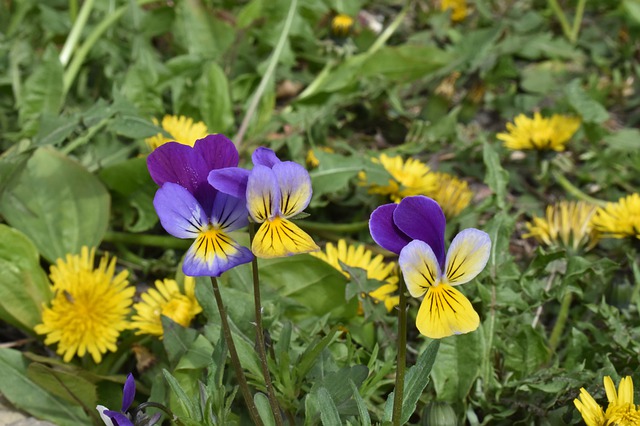 |  |  |  |  |
 |  |  |
Wild Pansy
- annual or biennial plant, 10 to 20 cm tall. Rhizome creeping. Stem erect, thin, branched. Leaves subordinate, rounded heart-shaped with large leaflets. Lower leaves petiolate, stem leaves sessile. Flowers solitary, large (up to 3.5 cm), irregularly shaped on long flower stalks. The flower consists of 5 petals of different sizes: most often the top two are dark- or blue-pansy, the two sides are light purple, the lower petal is larger than all of them and usually yellow or white, but specimens of other colors are also found in nature. Fruit - three-part box up to 1 cm in size. Blooms from April to late autumn. The seeds ripen from June to October.
The entire surface part of the
wild Pansy
is used for medicinal purposes. Collect both
wild Pansy
and Field Pansy. The plants are harvested at the beginning of flowering from May to June, cutting slightly above the ground. The collected grass is dried on sieves, in a shaded, well-ventilated room or in forced dryers, not exceeding 40C. It is recommended to start drying in time, the sooner you start, the more valuable substances will be preserved.
The healing properties of the
wild Pansy
are related to the biological activities of the substances contained in it. Wild Pansy
contains the alkaloid violaemitin, tannins, coumarins, saponins, flavonoids (violaquercetin, vitexin, orientin, violatin, rutin, etc.), anthocyanins and leukoanthocyanins, polysaccharides, mucilages, tartaric acid, ursulic acid and salicylic acid, vitamin C, carotenoids. Macroelements: potassium, calcium, magnesium, iron; trace elements: manganese, copper, zinc, cobalt, molybdenum, aluminum, barium, selenium, nickel, strontium and lead. Concentrates iron, zinc, molybdenum, barium and selenium.
Medicinal significance
Plansy plants work as expectorants and anti-inflammatory agents, they also have moderate choleretic and diuretic effects.
Concentrations and decoctions strengthen the secretion of bronchial glands, soften irritating plaques, liquefy sputum and help it separate, enhance the activity of mucous cilia epithelia, promote faster evacuation of sputum, thus calming cough.
Anti-inflammatory properties are provided by the pharmacologically active essential oil and mucilaginous substances present in the plant, which have an antiseptic effect on the digestive tract, enhance the secretion of the bronchial glands and facilitate the output of sputum.
Wild Pansy
preparations increase the excretion of urine and sweat, improve metabolism in case of skin diseases and have an anti-diathesis effect, they reduce the permeability of blood vessels. The roots of the plant act as a laxative and emetic.
Saponins present in
wild Pansy
have a broncholytic, expectorant and diuretic effect.
The alkaloid violaemytin also produces an expectorant effect.
Violaquercetin, a flavone glycoside, contributes to the compaction of cell membranes, reduces the absorption capacity of inflamed tissues through local and resorptive action.
A moderate antispasmodic and choleretic effect is observed when
wild Pansy
preparations are used.
Wild Pansy
has found wide application in folk medicine. It is used in case of severe cough and other respiratory diseases. The formulation is used as an oral and topical agent to treat: acne, rashes, boils, eczema and itchy skin. Children are given baths with this herb in case of scrofula (diathesis).
Wild Pansy
drugs are recommended for kidney and urinary tract inflammation. The plant is used in complex therapy for the treatment of kidney stones, uric acid diathesis and other urological diseases.
The oral cavity is rinsed with plant extracts in case of toothache, inflammation of mucous membranes, periodontosis.
For men
The plant is good for preventing inflammation of various urinary output channels. It can be used, along with other herbs, to treat prostatitis and cystospasm. Field pansy can also be used equally.
